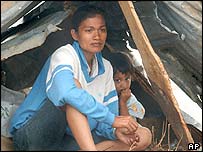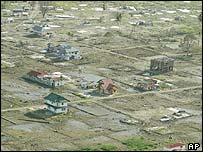Entered into the database on Sunday, June 26th, 2005 @ 14:21:54 MST
A survey by Oxfam found that aid had tended to go to businesses and landowners,
exacerbating the divide between rich and poor. The poor were likely to spend much longer in refugee camps where it is harder
to find work or rebuild lives. Oxfam has called for aid to go to the poorest and most marginalised. They must not be left out of reconstruction efforts, the charity said. The tsunami in the Indian Ocean on 26 December killed at least 200,000 people
in countries as far apart as Indonesia, Thailand, Sri Lanka and Somalia. David Loyn, the BBC's developing world correspondent, says it is perhaps not
surprising that the poorest suffered the most from the disaster itself. Living in frail shelter, on marginal land, they were literally swept away by
the waves, and the survivors among the poorest communities had less access to
medical help than richer people did. Intolerable gaps The survey points to the marginalisation of dalits - outcasts in India - and
specific problems in Sri Lanka where aid has gone to businesses and landowners
rather than the landless. This poverty gap is worst in Aceh, the Indonesian province which was the most
badly affected area, already impoverished by conflict before the tsunami hit. Half a million survivors were homeless. Yet the wealthier among them have already been able to move out of temporary
camps. Another survey by a group of British academics monitoring the delivery of aid
has found that, six months on, there is little evidence of permanent accommodation
being built for most people. It says starkly that these failures would not be tolerated after a disaster
in the developed world. All aid agencies, as well as regional governments must share some blame for
this failure, our correspondent adds. The unprecedented international response to the tragedy means that the immediate
humanitarian demands could be fully funded. Failure to deliver assistance effectively to the poorest, or to plan properly
for the future, reveals fundamental weaknesses in the system.

